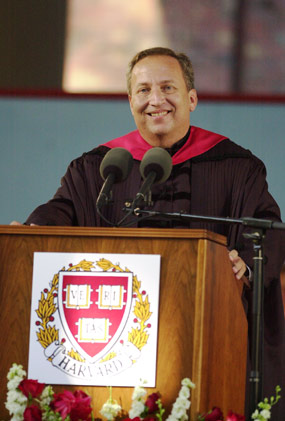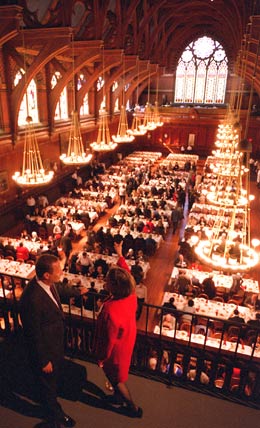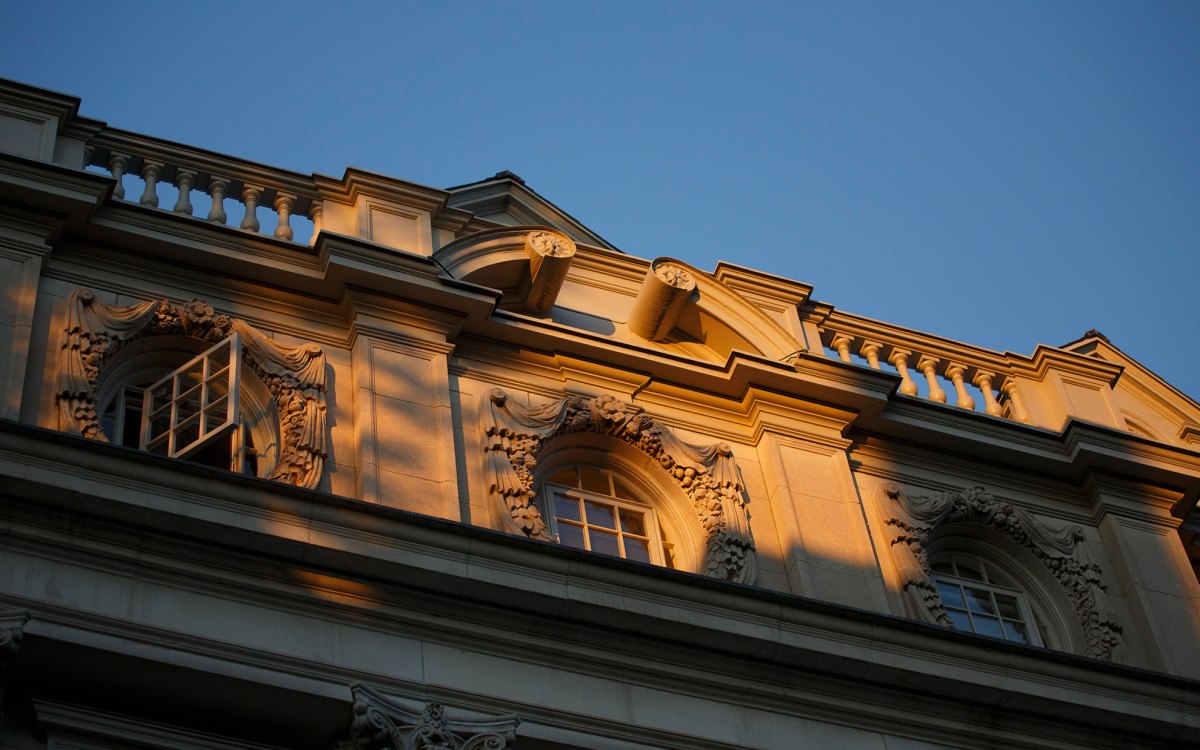‘Truth – Veritas – an end in itself’
Speech stresses teaching, science literacy, and growth

On a day steeped in centuries-old ceremony, President Lawrence H. Summers delivered an inaugural speech that nodded briefly to the past but looked boldly forward. “Perhaps the most important creative tension in our university is this: we carry ancient traditions, but what is new is most important to us,” he said, adding, “Our most enduring tradition is that we are forever young.”
Reverent and humorous, visionary and congratulatory, Summers’ 30-minute address brought chuckles and outbursts of applause. He laid broad plans for the University’s future under his leadership, including improving the quality of undergraduate education, enhancing science literacy, and expanding the campus into Allston.
Summers began with an acknowledgement of “all of those who have built Harvard from a small school in a cow yard … to the vibrant university of today.” He thanked former Harvard President Neil L. Rudenstine, crossing the stage to embrace him, for passing on a Harvard that is stronger than the one he inherited 10 years ago. Summers humorously disputed former President Eliot’s claim that his position would be measured by the “capacity to inflict pain”; rather, he promised to “do my best to hear Harvard’s many voices, and to respond.”
In the shadow of the events of Sept. 11, Summers mused on the role and responsibility of a university like Harvard. The relentless pursuit of truth, openness to ideas as well as idealism, and a commitment to service have kept universities relevant in a changing world. “We cultivate what is special and intellectual here, but we must also nurture the value of generous public service to society beyond these walls,” he said.
Acknowledging Harvard’s physical and financial riches, Summers outlined the University’s challenges and shared his thoughts on the future. “We will – and we should – be judged not by what we have, but by what we do; not by what we accumulate, but by what we contribute,” he said.
Undergraduate education topped his list, and he pledged to expand the faculty and examine curriculum and teaching methods to ensure that the minds of Harvard College students are “set on fire.” “Whether in the classroom or the common room, the library or the laboratory, we will assure more of what lies at the heart of the educational experience – direct contact between teacher and student,” he said.
Summers called for a University “united by common convictions and common objectives.

“Every tub,” he continued, “may rest on its own bottom, but all draw on the reservoir of knowledge and tradition that Harvard represents. And the strength and reputation of each depend upon the strength of all.
“We will not sacrifice the flexibility and innovation that autonomy promotes. But we will assure that Harvard, as one university, exceeds – by ever more – the sum of its parts.”
United, he said, Harvard is poised to create a campus in Allston that leaves as enduring a legacy as the Business School, built on a swamp, or the Kennedy School, which rose from a train yard. “If we make the right choices … we will have earned the gratitude of future generations,” he said.
Applause erupted as Summers addressed financial aid, sharing his hope that all schools of the University would, like Harvard College, make it possible for students to attend regardless of their ability to pay.
Science, technology, and globalization will demand Harvard’s attention in the future, Summers said. Calling the coming century “the century of biology and life science,” he stressed that future graduates should be as conversant in genomes as they are in Shakespeare. Harvard will also need to carefully consider the 21st century explosions of information technology and globalization, thinking about how we can “contribute as much to as many as possible,” he said.
Calling Harvard’s gloried past a “prologue only if all of us now do our part to make it so,” Summers closed by expressing bravery in the face of challenges and risks ahead. “In this new century,” he said, “nothing will matter more than the education of future leaders and the development of new ideas.”




